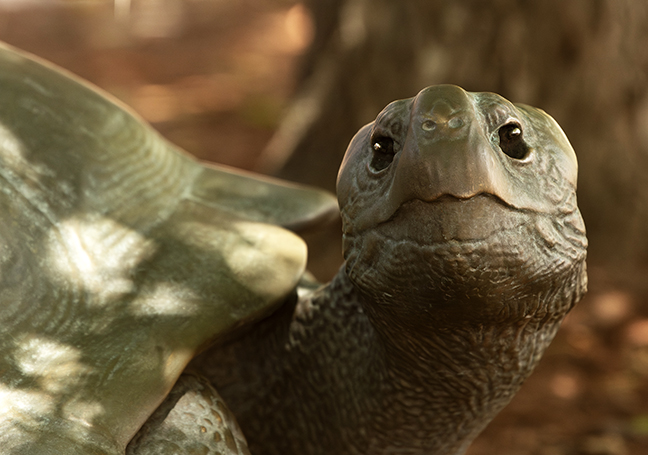Welcome!

In celebration of the Zoo’s 50th anniversary, sculptures of the zoo’s first residents, Galapagos tortoises Tort and Retort are now on permanent display. Eric Abernathy/Randolph Hub
50 years young, Zoo looks back and forward
ASHEBORO — The North Carolina Zoo was closed to the public on Aug. 2 but open for a VIP celebration.
It was the official 50th anniversary gala at the world’s largest natural habitat zoo. It first opened in 1974 with the Interim Zoo while the first continent, Africa, was being built.
Pat Simmons, executive director of the zoo, directed the guests to sculptures in the North America plaza of Tort and Retort, Galapagos tortoises who were the first animals at the Interim Zoo. To christen the sculptures, she asked NC First Lady Kristin Cooper to cut a ribbon while two real-life Galapagos tortoises ate through a ribbon of veggies. Simmons said the sculptures will be on permanent display at the zoo.
Leading off the speaking program was Quinn Godwin, associate director of the NC American Indian Heritage Commission. He did a reading recognizing that Native Americans first lived on the land and were its first stewards. Simmons said the Land Acknowledgement would be displayed in brass at the zoo.
Simmons then went through a brief history of the zoo. “Over 50 years ago people were talking about building the largest natural habitat zoo.” She said those first leaders had a mission to preserve wildlife and educate the public on conservation.
“All of you made this happen,” she said to the assembled VIPs.
Simmons acknowledged the contributions of the NC Zoo Society, elected officials, Randolph County, the City of Asheboro, and current and past zoo employees.
She introduced NC Sen. Dave Craven, who has been instrumental in getting state funds for large projects such as construction of Asia and the replacement for the Aviary.
“This is an exciting day,” Craven said. “I see a lot of people who have been a part of this.”
Craven noted that the zoo honored its 30 millionth visitor this year, what he called a “huge milestone.” He said the zoo has an economic impact on the area of $184 million each year and added that the opening of Asia will make the zoo a two-day experience.
Craven said the General Assembly had approved $75 million to build Asia and $60 million for the new Aviary.
“And you couldn’t ask for a better leadership team,” he said.
Walker Moffitt, mayor pro tem of the Asheboro City Council and chair of the NC Zoo Council, said his family’s property was “just over the ridge” and that he grew up exploring the land.
“This is our zoo and it has a special place in my heart,” he said. “The zoo believes everyone has the right to engage with nature. I consider the zoo to be a legacy to the people of North Carolina. The zoo has fulfilled the dream of being like no other.”
Margery Springer, chair of the NC Zoo Society, said the zoo couldn’t be what it is without “so many passionate people who contributed. Every contribution is critical to success.”
Darrell Frye, chair of the Randolph County Board of Commissioners, said he used to take his children and grandchildren to the zoo. “It’s been a part of my life from the very beginning. The county played an integral role in its opening,” providing water and sewer lines to the site.
“In 1973, we rezoned the acreage to provide for a natural habitat zoo,” Frye said. “I’m glad to have played a role in making this happen.”
The NC Zoo was recently annexed into the City of Asheboro, Mayor David Smith said. The city will now be providing fire and police protection to the zoo, as well as utilities.
“We have an asset here beyond anything in North Carolina,” Smith said. ”It’s a huge economic engine with 350 full-time employees and 700 during peak seasons.”
Smith noted that he was a freshman at Appalachian State University in 1971 when he read in the paper that Purgatory Mountain was selected as the zoo site. He showed that story to his college friends but they refused to believe it, he said. But then he saw dirt being moved at the site.
“What you’re seeing is a testament to those who worked so hard,” Smith said. “We have a huge partnership with the zoo. The city has bought in and it’s a blessing to us.”
US Rep. Richard Hudson said he has always loved visiting the zoo with his family. He called it “a sanctuary of learning and a connection to nature. There’s nothing like seeing the animals in person. We’re fortunate to have such a phenomenal resource.”
Reid Wilson, secretary of the Department of Natural and Cultural Resources, which oversees the zoo, thanked the General Assembly for its support of the zoo. In his duties he often comes to the zoo, he said, and is “impressed with the operation here. This place is an amazing treasure. It has a huge role in education,” with more than 100,000 school children visiting free of charge each year.
North Carolina First Lady Kristin Cooper noted “how important the zoo is. Every dollar spent benefits people.” She gave a “shout-out to the visionaries.”
After lunch, the guests were welcome to visit the zoo and take behind-the-scenes tours to a number of exhibits. Some even visited the construction site where Asia is being built.
The evening ended with a reunion of current and past employees.
